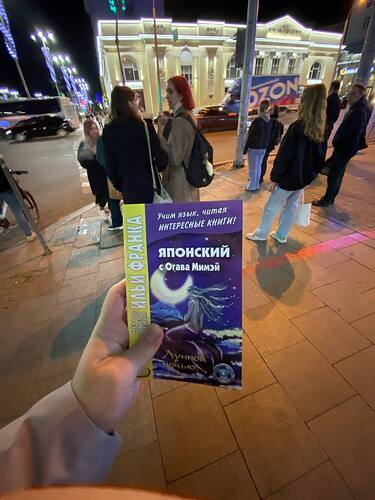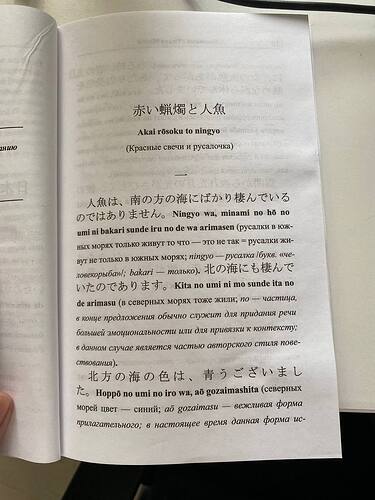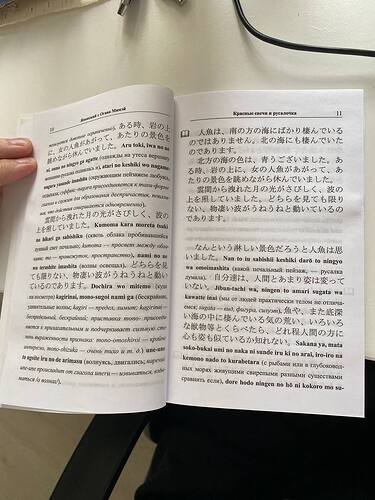At first you’d better to copy good speeches, it’s ok if you don’t understand any words yet, just copy the sounds and rhymes produced by native speakers.
Professional speakers are preferable, like actors, announcers, singers, idols…but I don’t recommend copying any kind of amateurs, like Podcasters, independent YouTubers, so-called language teachers on SNS.
Hi Komori ![]() , I was going to the countryside for the weekend. How are you?
, I was going to the countryside for the weekend. How are you?
Yes, that’s what I do - I listen to Japanese podcasts while I’m working. But sometimes I want to know how to read a specific word or phrase. because I haven’t listened to it on podcasts before.
I found another service for voicing Japanese words, please rate it as it is.
Narakeet - Easily Create Voiceovers and Narrated Videos Using Realistic Text to Speech!
text: 親愛なる友人たち、こんにちは。
ご覧いただきまして誠にありがとうございます
この動画は最近よく出てきます
十分な科学的研究はたくさんあります
現代的であることを明確に示しています
人は~に重大な欠乏症を持っている
深いコミュニケーションをとっている親しい友人
これらの友人たちとの暴露など
そして一般に、これらの作品は非常に明確です
これが前例のないことであることを示す
深い社会的孤立
人間としては完全に非定型的
親切
~に非常に強い影響力を持っている
生理学的健康と
精神状態とかこんな感じ
より広い社会的文脈
This website is quite useful, interestingly.
Not perfect but it is far better than I thought.
Let me check all of the voices real quick.
Yuriko and Kenichi are passable, the rest are just bad.
To the countryside? That’s great!!
I also went to the nicely mountainous region this weekend, what a coincidence.![]()
These days there are many crickets and some other ‘musical’ insects playing the orchestra outside, when you go to the onsen you can hear them singing among the summerly coloured woods.
And it is really nice when the twilight sparkle over the prolific mountain tops when you taking a bath time, listening to the nature’s orchestra, feeling the gently cool breeze preceding the lovely autumn.![]()
Let me take you down, it’s just my humble home sweet home.
I don’t go outside.![]()
![]()
![]()
Though, just the onsen part is a lie. Other parts are quite normal country life in Japan.![]()
It looks like we both had an amazing weekend! You wrote it in such a way that I burst out laughing! ![]() I wouldn’t leave my home either if I had such a cozy place like your humble abode. Onsen sounds tempting right now.
I wouldn’t leave my home either if I had such a cozy place like your humble abode. Onsen sounds tempting right now.
Speaking of the countryside, I love watching the YouTube channel Takasu.
Itsumo tetteiteki ni kakunin shite kurete, arigatou, Komori ![]()
Wow, I love this video.![]()
Quite familiar landscapes for me, hahaha. He should just add some of over 90yo neighbours, then it would be perfection.![]()
Allow me to say just one thing…![]()
There’s no grammar mistakes!!!
Nicely amazingly done, you’ve got it perfect!![]()
![]()
![]()
Oh, I absolutely adore such landscapes. Chatting with you has definitely improved my skills; I’m afraid to imagine what’s next ![]()
У нее есть сертификат JLPT N1.
Это ободрительный, что она и не знает много иероглифы.
тут весь список иероглифов для сдачи экзамена JLPT N1
@anon22547673 、お願いします、私は日本語のテキストで男性と女性を区別する方法がわかりません。例えば、男性と女性が共同で何か行動をした場合、どちらがどちらかをどう判断すればいいか教えていただけますか?例えば、『私はやりました』という文をどう判断すればいいのでしょうか?
Похоже, нам нужно изучать большое количество иероглифов. Столько количество, сколько школьники средней изучают.
——
In fact, it is a tougher part for JP learners.
Good question.
私 can be used by both genders, and the style of the sentence is neutral. So we can’t decide with that sentence.『私はやりました』
―
We can assume what gender a speaker has, sometimes by the style of wording, sometimes by the subject pronoun.
Example…
おい、こっちに来いよ。
Hey, come here.
Generally おい used by male speakers.
Also generally, the imperative verb 来い used by male.
—
ねえ、こっち来なよ。
Hey, come here.
The interjection ねえ and the imperative form 来な both generally used by female.
—
あたしが読んでた本、どこにあるか知らない?
Do you know where the book, which I was reading, is?
あたし('Atashi) is a reduced form of 私(Watashi), and it is generally a feminine pronoun.
——
From the cultural standpoint, boys and girls are advised, by adults, to use proper wording styles matching with their genders.
But actually, there is no precise way of distinguishing the gender of a clause Subject.
You don’t need to think too much about grammatical genders when you use Japanese language. Indeed it is a tough part for learners.
Interesting information! Thank you for the clarification. I come across more female podcasts in Japanese, so in my self-conversations (yes, I talk to myself in Japanese ![]() ), I’ve started using “ねえ,” which turns out to be feminine.
), I’ve started using “ねえ,” which turns out to be feminine. ![]() Or I say “早く来なさい,” but it seems I should say it correctly as “早く来い”?
Or I say “早く来なさい,” but it seems I should say it correctly as “早く来い”?
Yes, you understand it correctly. ねえ usually sounds feminine or like a young kid, and also it sounds informal.
But there’s no rules restricting this kind of usage from any man. It really depends on the person’s character.
I assume you know Hisoka, a manga character from HxH. He doesn’t say おい in the entire series, instead he uses ねえ. It illustrates his character.
We can see, from his speech styles, that he want to exhibit himself as a person who isn’t too mascular, isn’t too formal, isn’t too firm but softer, isn’t too passionate but calmer.
Speaking of grammatical gender, yes it is more masculine when you say 早く来い. Nicely guessed.![]()
However, imperative phrases in Japanese are very tricky. It may sound offensive sometimes.
I suggest you better to use ~ください form until you’ve become truly fluent.
Like, 早く来てください. Or its shortened form 早く来て. These are much safer choices.
Komori-sensei, thank you for the detailed explanation! It’s so interesting to learn about the nuances of speech style. Now, I’ll be sure to pay attention to this in anime. By the way, I haven’t watched “Hunter x Hunter,” but I understand which character you’re referring to. ![]() I tend to watch lighter anime, and in terms of action, I’ve only seen “One Punch-Man.” My favorite anime includes “Saiki Kusuo no Psi Nan,” “Hataraku Maou-sama!,” and “KonoSuba,” and they all feature female characters. Speaking of anime, in “Saiki,” he often says “ハリアリ,” which leaves me puzzled because it’s translated differently each time into Russian. What does he actually mean by that, and do regular people use such a phrase in conversation?
I tend to watch lighter anime, and in terms of action, I’ve only seen “One Punch-Man.” My favorite anime includes “Saiki Kusuo no Psi Nan,” “Hataraku Maou-sama!,” and “KonoSuba,” and they all feature female characters. Speaking of anime, in “Saiki,” he often says “ハリアリ,” which leaves me puzzled because it’s translated differently each time into Russian. What does he actually mean by that, and do regular people use such a phrase in conversation?
Once again, thank you for the explanations. I’ll continue to learn and improve ![]()
I tend to watch lighter anime, and in terms of action, I’ve only seen “One Punch-Man.” My favorite anime includes “Saiki Kusuo no Psi Nan,” “Hataraku Maou-sama!,” and “KonoSuba,” and they all feature female characters. Speaking of anime, in “Saiki,” he often says “ハリアリ,” which leaves me puzzled because it’s translated differently each time into Russian.
Quite a good taste you have! ![]()
I haven’t watched Saiki Kusuo so I googled about that ハリアリ thing. There’s no information about it.
Perhaps is it やれやれ?
It indicates the speaker’s small disappointment towards the hearer, or the entire situation.
やれやれ can use in everyday conversation, but sometimes it sounds a bit literature-like.
—
Anime characters tend to speak too dramatically, so don’t let your guard down.
For example, I do not recommend you to talk like Darkness from Konosuba. Hahaha![]()
Saiki
Thank you for the compliment! Yes, it’s definitely ‘やれやれ.’ Saiki was my first anime.
I agree, sometimes anime characters can overdo the drama. But, you know, sometimes in life, you need to add a bit of anime-style to make conversations more interesting! ![]() But yeah, Darkness or Lalatina from “KonoSuba” might be a bit too much even for me!
But yeah, Darkness or Lalatina from “KonoSuba” might be a bit too much even for me! ![]() Hahaha
Hahaha
昨日、散歩していて、子供の頃によく行っていた本屋さんの前を通りました。いろんな本を見て、心がそこに行く気になりました。素晴らしい日本語の学習書を買いました。
GPT translated the introductory chapter:
ブロック引用 この本の要点は、「この本の読み方」です。時折、「もう十分理解しているだろう」という瞬間が来るかもしれませんが、その時は逆に、アダプテーションされた部分を最初に読むのではなく、アダプテーションされていない部分を最初に読んでみてください。この読み方は、ゼロから言語を学んでいる人にもお勧めできます。
言語は本質的にツールであり、目的ではありません。したがって、言語は専門的に学ぶときではなく、自然に使うときに最も効果的に習得されます。それは生のコミュニケーションや興味深い読書の中で学ぶことが最も効果的です。そのときに言語は自然に身につき、潜在意識の中で学ばれます。
記憶には、単調な暗記や特定のスキルの獲得ではなく、新しい経験が必要です。 単語を何度も繰り返すのではなく、さまざまな文脈や異なる意味の中で単語を出会うことが大切です。 提供される読書においては、共通の語彙の大部分は単語の繰り返しによって暗記する必要はありません。 テキストを読み終えたら、その中の単語を暗記しようとしないでください。 「次に進む前に完璧に覚えなければならない」という原則は適用されません。 読む頻度が高く、速く進むほど良いです。 この場合、奇妙なことに、浅く、リラックスしているほど良いのです。 そして、その後、素材の量が効果を発揮し、量が質に転換されます。 したがって、あなたに求められるのは、単に内容について考えることです。 そして、語学を教えられている言語ではなく、学ばなければならない内容についてです。
何年も一つの言語を学んでいる人々の主な問題は、それを少しずつ学んでおり、完全に没頭していないことです。 言語は数学ではなく、学んでいるものではなく、慣れているものです。 ここで大事なのは論理ではなく、記憶力ではなく、スキルです。 この意味で、言語は定期的なトレーニングのようなものであり、それ以外の場合は成果が得られません。 即座にたくさん読み始めることで、日本語での自由な読書は3〜4ヶ月で可能になります(「ゼロから」開始する場合)。 少しずつ学んでいる場合は、自己を苦しめるだけで、停滞します。 ですから、この本を読み終えたら、日本語で簡単に辞書を引きながら読書を続けてください。
文法についてはどうでしょうか? 実際、このようなヒントがついたテキストを理解するためには、文法の熟知は必要ありません。 すべては理解できるでしょう。 その後、特定の形式に慣れていく過程が始まり、文法も潜在意識の中で学ばれます。 言語は、文法を学ばない人々によっても習得され、言語環境に適応されます。 これは文法を避けることを提案しているわけではなく、文法は非常に面白いものですので、それに取り組むことをお勧めしています。 ただし、この本の読書を開始する際に必要なのは、読み方のルールと基本的な文法のみです。
この本は、多くの時間と労力を節約しながら、語彙を獲得し、言語の論理に慣れるのに役立ちます。 ただし、一度読み終えたら、止まらないで、他の外国語で読書を続けてください(今度は本当に辞書を引くだけです)!
とにかく、この本を見つけて本当に幸せです



